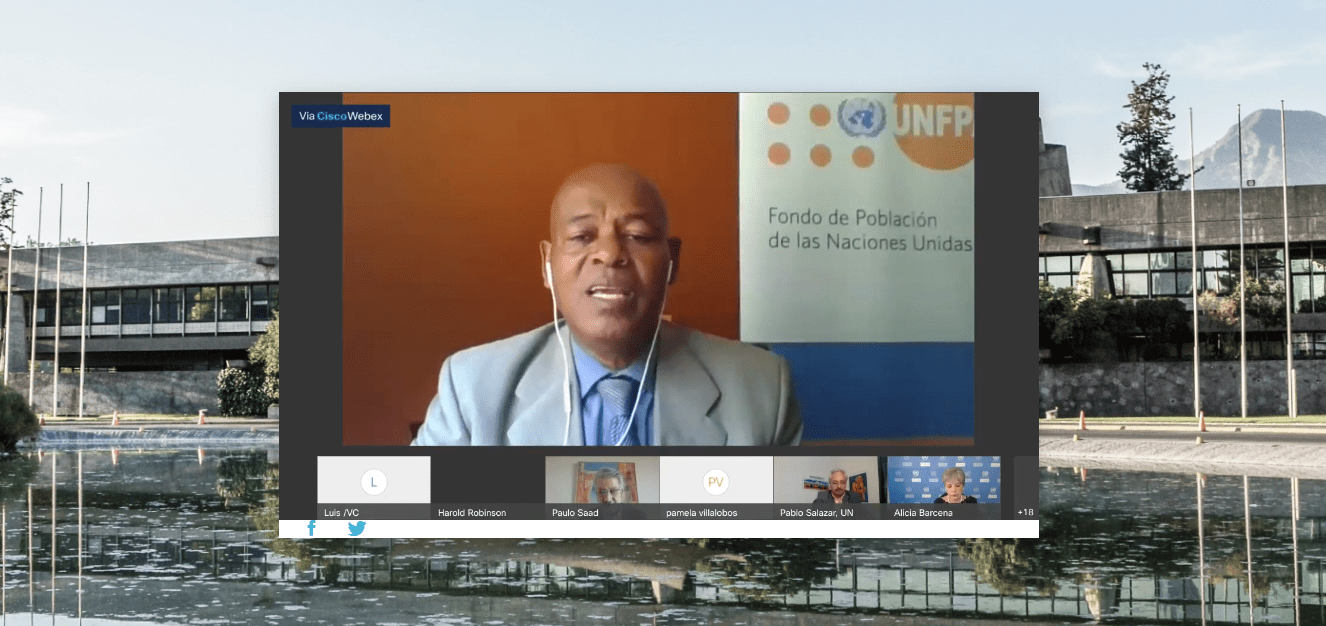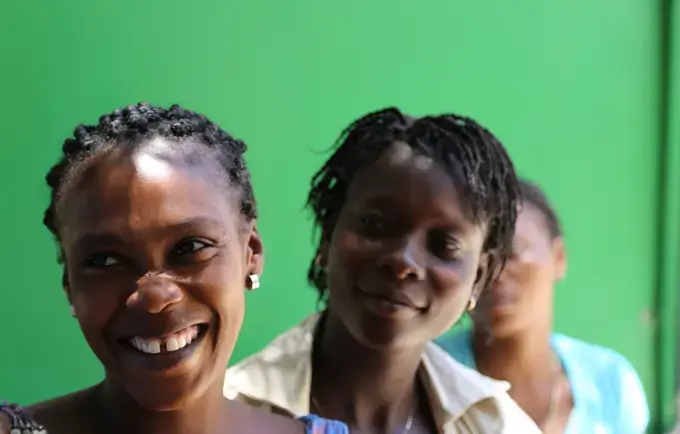Alicia Bárcena, ECLAC's Executive Secretary; Harold Robinson, UNPFA’s Regional Director for Latin America and the Caribbean, and Gerardo Zavaleta, Peru's Vice Minister of Vulnerable Populations, joined a virtual conversation on the impacts of COVID-19 on Afro-descendant populations.
Through a virtual conversation held in the context of the Regional Conference on Population and Development in Latin America and the Caribbean, experts from the region made a call to renew the commitment to advocate for the human rights of Afro-descendant populations and redouble efforts to fight racism and discrimination.
Alicia Bárcena, Executive Secretary of the Economic Commission for Latin America and the Caribbean (ECLAC), Harold Robinson, Regional Director for Latin America and the Caribbean of the United Nations Population Fund (UNFPA), and Gerardo Zavaleta, Peru's Vice Minister of Vulnerable Populations, on behalf of the Chair of the Regional Conference on Population and Development inaugurated the event The impacts of COVID-19: an opportunity to strengthen the realization of the human rights of Afro-descendant populations in sustainable development. Epsy Campbell, Vice President of Costa Rica, also participated in the discussion panel together with government authorities and representatives of academia and civil society.
During her participation, Alicia Bárcena stressed the urgent need to place the human rights of people of African descent at the center of public policy in countries in the region. She also urged the participants to take advantage of the crisis caused by the pandemic to create a paradigm shift and lay the foundations for the implementation of sustainable and inclusive development, free of racism and discrimination, in the region.
She affirmed that, at present, approximately 134 million of Afro-descendants (or 21% of the population in the region) live in Latin America.
"People of African descent continue to lag behind in the majority of socioeconomic indicators and, together with indigenous peoples, they are the region's most persistent population segment living in poverty as a result of a history of endemic and structural subjugation, marginalization, discrimination and racism," she said.
ECLAC's Executive Secretary also mentioned that the Afro-descendant presence in our continent dates back more than five centuries, and the huge consequences of slavery, which enriched colonial elites, have not being rectified by its abolition or the emergence of nation states. On the contrary, only grew, placing people of African descent in a position of subordination and political, economic and social disadvantage.
“While racial segregation policies, like those in the United States were not implemented in Latin America, "the ideology of the mixing of races imposed in the first half of the last century made the existence of people of African descent invisible in several countries in the region. Ignoring the contributions of the afro descendant culture to the development of our nations and denying the pride of their legacy in our societies, thus hiding and perpetuating racial inequalities and secular racism, which today, amid the pandemic, literally kills”, she added.
She also stated that people of African descent have not only been highly resilient and have fought back permanently, but have also managed to bring attention to their historical demands in international, regional and national agendas mainly during this century. And highlighted achievements made in the creation of laws and implementation of policies to pay off the historic debt with countries in the region.
Finally, Alicia Bárcena made a call to redouble efforts for the implementation of the Montevideo Consensus on Population and Development, a regional instrument that outlines the commitments whose achievements will represent a crucial contribution to the Sustainable Development Goals of the 2030 Agenda so that no one is left behind.
Harold Robinson, on the other hand, affirmed that there is a significant gap in terms of data disaggregated by ethnicity and race in most countries in the region, which makes it difficult to assess the impacts of the pandemic on the Afro-descendant population.
"In Brazil, for example, the latest epidemiological bulletin indicates that 38.2% of COVID-19 infections correspond to the Afro-Brazilian population, compared to 33.4% for the white population," he added.
He stressed the need for effective coordination between States, the United Nations System and civil society, in the context of the first five-year period of the International Decade for People of African descent. In order to assess actions carried out to date and reorient strategies to advance the agenda of rights of people of African descent and the fight against racism and racial discrimination.
"As part of our Regional Strategy to leave no one behind, UNFPA is committed to making its best effort and utilizing its human and financial resources, working together with all of you, to accelerate this progress," he affirmed.
Peru's Vice Minister of Vulnerable Populations, Gerardo Zavaleta, affirmed it is essential for governments in the region to ensure the population of African descent has access, in conditions of equality, to decent housing and basic services such as water, electricity, sanitation, new technologies, health, education and decent employment.
He added that renewing the commitment to the Montevideo Consensus and other international instruments must be an imperative in the region, especially amid the current health crises.
"In addition to the quest for equality and social inclusion for Afro-descendant populations, our actions should definitely be aimed at fighting racism and xenophobia," he said.
This event was the second of a series of virtual conversations, organized to analyze the sociodemographic scenario of countries in the region in the context of the COVID-19 crisis and its potential short, mid and long-term consequences‑ for the most vulnerable population groups in light of the priority measures of the Montevideo Consensus on Population and Development and the objectives and goals of the 2030 Agenda for Sustainable Development.





